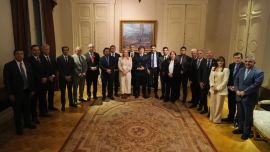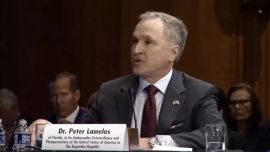When Security Minister Sabina Frederic livened up a flat and extremely mediocre electoral campaign now entering its final pre-primary week by blurting out: “Switzerland is calmer but more boring” (probably the most massively repudiated phrase of the week), she was not treading any new ground in attempting a positive comparison with that haven of Alpine prosperity – a decade ago, then President Cristina Fernández de Kirchner said proudly: “I’m never neutral, I’m not Swiss” (a curious differentiation from her presidential husband whose ancestors came from Interlaken), repeating that idea in later years. Perhaps what Kirchnerism abhors most about Switzerland is not only the neutrality but also the centrality of that landlocked country bang in the middle of Europe – an aversion to the middle ground upon which it will depend so much in the next couple of months.
Frederic was quite rightly blasted by countless voices last week for implying that there is anything amusing or entertaining about crimes like, for example, the La Plata man recently slain outside his front door while taking out the garbage. But a more oblique interpretation of the weird logic behind her clumsy remark might be that she believes boredom to be a real danger alongside the all too obvious perils of crime. After all, while figures like 82 murders in the first third of this year just in Rosario might shock, Argentina has the lowest crime rate in Latin America outside Uruguay and Chile with violent upheavals on the rise in the latter. While we are just one week away from the first round of voting with one Corrientes provincial deputy shot in the stomach as the only instance so far of a political violence which was tearing this country apart half a century ago (touching wood and crossing fingers, of course), no less than 90 candidates were shot dead ahead of Mexico’s midterms last June. Perhaps Frederic thus fears that we could be closer to the boredom of Switzerland than the violent crime endemic in most of Latin America’s Caribbean seaboard in particular.
But here she has little enough to fear – that famous phrase of common sense being the least common of all senses could be paraphrased to read that normalcy is the least normal of all conditions when looking around today’s world while remaining an extremely remote horizon in Argentina. Perhaps the fear of boredom refers more specifically to the extreme mediocrity of this election campaign? Yet more than mediocrity the real danger of this campaign is the lack of clarity for a pandemic-stricken country which has lost its faith in the future to an unprecedented degree (far more so than during the 2001-2002 meltdown) – a confusion afflicting both major coalitions.
This brings us to the week’s other main clumsy remark – President Alberto Fernández saying on Tuesday: “I will not betray Cristina nor Máximo nor Massa nor the people who voted for me.” Quite apart from the tell-tale detail of the people being at the bottom of his list, why would he even need to say that if the idea of betrayal was not in his mind, his coalition allies must be wondering? More importantly, this gratuitous pledge encapsulates the complexity of a ruling coalition which goes beyond being split into moderate and extreme wings – even within those wings it is hard to find any consistency over such issues as negotiations with the International Monetary Fund.
A clear majority of the electorate (perhaps even as much as two-thirds) is disenchanted with this government but where do they go, especially if convinced that far from minor changes are required? The mainstream opposition’s candidates (former Buenos Aires Province governor María Eugenia Vidal and Buenos Aires City Deputy Mayor Diego Santilli) are experts in the middle ground but thus more inclined to prioritise consensus and dialogue over drastic reforms. Advocates of the latter have options both within the Juntos por el Cambio mainstream (ex-minister Ricardo López Murphy) and beyond with libertarians like José Luis Espert and Javier Milei. Radical outsider Facundo Manes offers some new approaches but is also teamed up with traditional Peronists, which works against change. And so on.
Still time for the final campaign between next Sunday and November 24 to start offering some constructive alternatives but the signs are not promising. Come to think of it, the politics in Switzerland is not very inspiring either but also far less needed.


















Comments